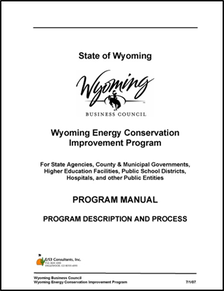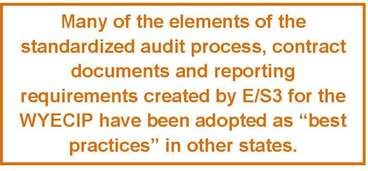Wyoming State Energy Office
Wyoming Energy Conservation Improvement Program
Wyoming Energy Conservation Improvement Program

E/S3 literally "wrote the book" on energy performance contracting (EPC) for Wyoming when we developed and managed the original state program under a multi-year contract with the State Energy Office. This program was designed by E/S3 to reduce risks for facility owners by providing substantial support from E/S3 as an independent third-party resource through the State Energy Office.
The first phase of this contract entailed management of the program development process, authoring the Program Manual and developing contract documents. A major component of program development was creating a defined process and reporting structure for Investment Grade Audits.
E/S3's program development effort pioneered a process that made Wyoming one of the first states to select and manage a group of pre-qualified ESCos that agreed to be bound by the program’s requirements. Accomplishing this at the state level helped ensure compliance by the ESCos and simplified the process for owners in choosing a contractor.
E/S3 was also responsible for performing program outreach state-wide and providing services to public and non-profit facility owners over the four-year term of our contract including:
- Providing education for facility owners on EPC and the state program.
- Performing feasibility studies and identification of potential conservation measures.
- Preparing solicitations of interest from the program’s prequalified ESCos.
- Evaluating ESCo responses to solicitations and facilitating ESCo interviews for the owner.
- Providing guidance to the owner for negotiations with the ESCo.
- Preparing the Investment Grade Audit Contract for execution by the owner and ESCo.
- Preparing the Energy Performance Contract for execution.
- Reviewing Investment Grade Audits and Project Proposals for consistency with the client’s goals, technical and financial reasonableness, and compliance with the program.
- Monitoring project construction.
- Reviewing measurement and verification reports.
- Making presentations to elected officials.
Wyoming is mostly rural and can even be called “frontier” in a lot of areas. This makes smaller individual project opportunities not so attractive to ESCos and results in higher costs to the owners for such things as ESCo project management and subcontractors. In many cases small projects were not attractive to either party for these reasons.
Under E/S3’s program management the WYECIP pioneered the “bundling” of projects with different government entities in the same geographical area. In practice, the different entities would agree on a single ESCo for all projects, through a solicitation and interview process guided by E/S3, and then each would enter into a contract with that ESCo. The selected ESCo was awarded projects with an aggregate size large enough to be attractive from a business perspective and government entities realized benefits from the lower costs to the ESCo and economies of scale.
Under the WYECIP, E/S3 provided services to three community colleges, four Counties, eleven Cities and Towns and two K-12 Public School Districts representing a total of more than 5.8 million square feet and resulting in five energy performance contract projects representing more than $11.5 million in improvements implemented. Close monitoring of contract requirements by E/S3 on behalf of facility owners, particularly those related to cost control and billing, resulted in construction cost savings for owners amounting to several hundred thousand dollars.
The remainder of the audits resulted in over $18 million worth of identified energy improvement projects that met the requirements for obtaining grants for construction under the American Recovery and Reinvestment Act of 2009 (ARRA) allowing owners to complete projects using traditional procurements, avoiding the higher cost of energy performance contracts.

Original language, processes, and other elements created by E/S3 for
the program's Request for Proposals, reporting requirements, contract documents and measurement and verification of savings have been adopted by other state programs as models for their own ESCo
pre-qualification and statewide EPC programs.
